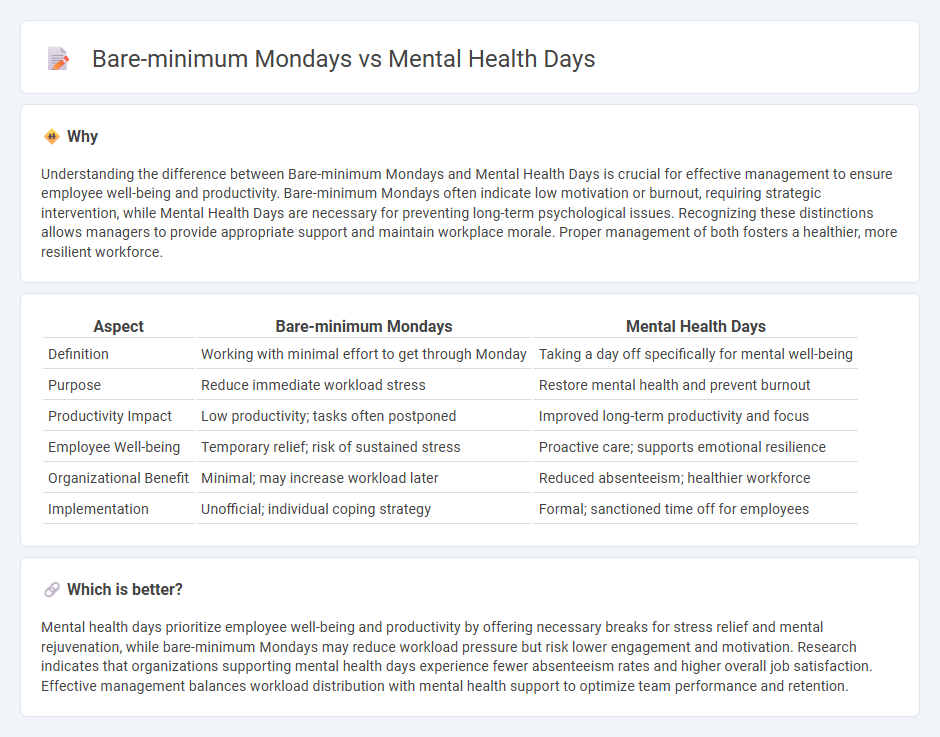
Organizations balancing productivity and well-being often face the challenge of distinguishing between Bare-minimum Mondays and Mental Health Days, two concepts that significantly impact employee performance and workplace culture. Bare-minimum Mondays refer to minimal effort at the start of the week, often due to burnout or low motivation, whereas Mental Health Days are intentional breaks aimed at improving mental well-being and preventing stress-related issues. Explore how effective management strategies can harness the benefits of Mental Health Days while mitigating the downsides of Bare-minimum Mondays for a healthier, more productive workforce.
Why it is important
Understanding the difference between Bare-minimum Mondays and Mental Health Days is crucial for effective management to ensure employee well-being and productivity. Bare-minimum Mondays often indicate low motivation or burnout, requiring strategic intervention, while Mental Health Days are necessary for preventing long-term psychological issues. Recognizing these distinctions allows managers to provide appropriate support and maintain workplace morale. Proper management of both fosters a healthier, more resilient workforce.
Comparison Table
| Aspect | Bare-minimum Mondays | Mental Health Days |
|---|---|---|
| Definition | Working with minimal effort to get through Monday | Taking a day off specifically for mental well-being |
| Purpose | Reduce immediate workload stress | Restore mental health and prevent burnout |
| Productivity Impact | Low productivity; tasks often postponed | Improved long-term productivity and focus |
| Employee Well-being | Temporary relief; risk of sustained stress | Proactive care; supports emotional resilience |
| Organizational Benefit | Minimal; may increase workload later | Reduced absenteeism; healthier workforce |
| Implementation | Unofficial; individual coping strategy | Formal; sanctioned time off for employees |
Which is better?
Mental health days prioritize employee well-being and productivity by offering necessary breaks for stress relief and mental rejuvenation, while bare-minimum Mondays may reduce workload pressure but risk lower engagement and motivation. Research indicates that organizations supporting mental health days experience fewer absenteeism rates and higher overall job satisfaction. Effective management balances workload distribution with mental health support to optimize team performance and retention.
Connection
Implementing bare-minimum Mondays allows employees to ease into the workweek, reducing stress and preventing burnout by prioritizing essential tasks. Mental health days complement this approach by providing dedicated time for self-care, further supporting overall well-being and productivity. Together, these strategies promote sustainable work environments that enhance employee engagement and long-term job satisfaction.
Key Terms
Employee Well-being
Prioritizing mental health days over bare-minimum Mondays significantly enhances employee well-being, reducing stress and boosting productivity. Studies show that organizations encouraging mental health breaks experience lower absenteeism and higher job satisfaction rates. Discover how implementing mental health days can transform your workplace culture and support employee resilience.
Burnout Prevention
Mental health days provide essential recovery periods that significantly reduce burnout risk by allowing employees to recharge and maintain productivity. Bare-minimum Mondays typically reflect disengagement and increased stress, often signaling early signs of workplace burnout. Explore effective strategies to optimize mental health and prevent burnout for sustained well-being.
Workplace Productivity
Mental health days significantly enhance workplace productivity by reducing burnout, improving concentration, and fostering employee well-being, whereas bare-minimum Mondays often result in decreased motivation and sluggish performance due to lingering weekend fatigue. Companies recognizing the value of mental health breaks report higher employee engagement and lower absenteeism rates. Discover how integrating mental health strategies can transform your team's efficiency and morale.
Source and External Links
The Mental Health Benefits of Taking a Day Off - Taking a mental health day, whether a full day or just a few hours, is essential for emotional well-being, helping individuals recover from stress and negative thought patterns, despite some stigma around such time off.
Should Kids Take Mental Health Days? - Mental health days for kids are breaks from school to rest and recharge, ideally spent on calming activities, and should be limited and planned thoughtfully to support ongoing mental well-being.
Observance Calendar - Various mental health-focused observance weeks and months throughout the year promote awareness and support for mental wellness, reflecting the importance of mental health in broader society.
 dowidth.com
dowidth.com